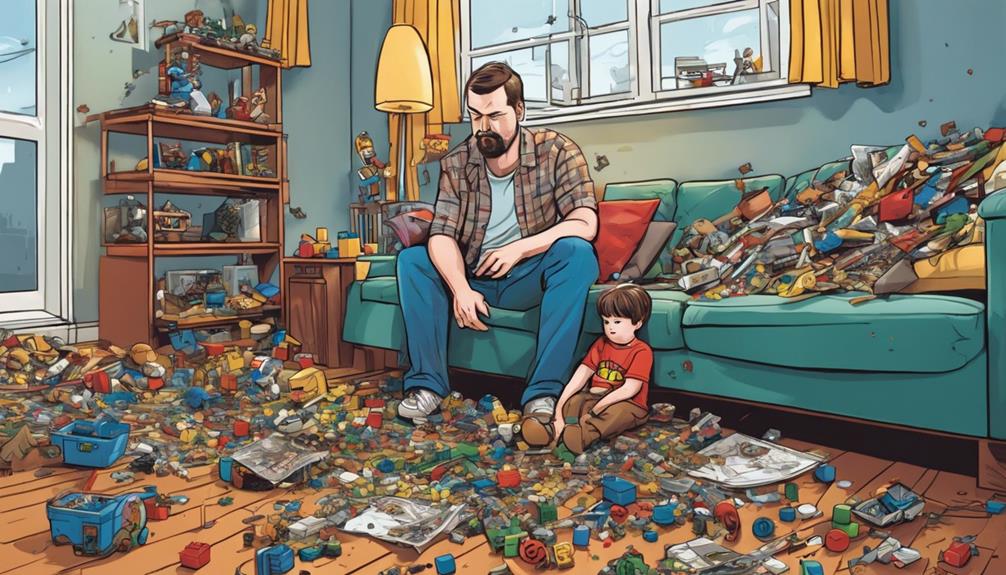Modern dads in today's society often battle overwhelming guilt, feeling inadequate and stressed amidst the demands of work and family life. This guilt can strain relationships, hinder effective communication, and negatively impact children's well-being. With pressures of time constraints and societal expectations, dads struggle to find a healthy balance. Online platforms like DadDadLife provide support and camaraderie for fathers facing similar challenges. By acknowledging these common struggles and seeking coping strategies, dads can work towards easing the emotional turmoil they experience. Understanding the shared experiences of others offers solace and valuable insights into maneuvering modern parenting complexities.
Key Takeaways
- Balancing work and family responsibilities leads to guilt.
- Dad guilt impacts parenting quality and family dynamics.
- Feeling inadequate in fulfilling parental duties is common.
- Lack of quality time with family causes emotional turmoil.
- Online platforms like DadDadLife provide support for struggling fathers.
Impact of Guilty Father Syndrome
Often, fathers experiencing Guilty Father Syndrome may find themselves grappling with the impact of their emotions on their parenting and family dynamics. This syndrome, characterized by feelings of inadequacy and self-blame, can lead to increased stress and strain within the family unit.
Research indicates that fathers who harbor guilt for not meeting perceived expectations may struggle to fully engage in their parental roles, potentially affecting their children's well-being. The pressure to excel at work while also being a present and nurturing parent can exacerbate these feelings of guilt.
Moreover, unresolved guilt may hinder effective communication and bonding with children, ultimately influencing family dynamics. Addressing and managing Guilty Father Syndrome is essential for fathers to cultivate healthy relationships with their children and partners.
Time Pressures and Parental Alienation

Fathers who struggle to balance work obligations with family responsibilities often find themselves facing time pressures that can contribute to parental alienation.
- Overwhelming Demands: Juggling work and family commitments can leave dads feeling stretched thin.
- Lack of Quality Time: Many fathers feel guilty about not spending enough meaningful time with their children.
- Impact on Relationships: Time pressures can strain the parent-child relationship, potentially leading to feelings of alienation.
- Emotional Toll: The constant battle to meet both work and family expectations can take a toll on dads, exacerbating parental alienation issues.
These challenges highlight the importance of finding a healthy balance between work and family life to foster strong, connected relationships with children.
Keyword Insights on Dad Guilt

The exploration of keyword insights sheds light on the multifaceted nature of dad guilt in modern parenting discourse. Below is a table summarizing key insights related to dad guilt:
| Keyword | Description | Impact |
|---|---|---|
| DadDadLife | Online platform for dads to share experiences and seek support. | Provides a sense of community for dads. |
| Fatherhood Penalty | Challenges faced by working dads in balancing career and family duties. | Increases pressure on dads leading to guilt. |
| Working Dad | Focuses on the struggles of dads juggling work responsibilities and family time. | Highlights the balancing act causing guilt. |
Common Struggles of Modern Dads

In the dynamic landscape of modern parenting, contemporary dads face a multitude of challenges as they navigate the complexities of work-life balance and family responsibilities.
Despite the evolving roles of fathers in today's society, many modern dads encounter common struggles that impact their well-being and relationships with their children. These challenges include:
- Juggling work demands and family time.
- Feeling inadequate in fulfilling parental duties.
- Struggling to find a balance between personal time and parenting.
- Experiencing guilt over not being present enough for their children.
These issues highlight the ongoing emotional turmoil faced by fathers endeavoring to meet the high expectations placed upon them in both professional and personal spheres.
Connecting Through Shared Experiences

Through shared experiences, dads can find solace in knowing that they are not alone in their struggles with guilt and work-life balance. Connecting with other fathers facing similar challenges can provide a sense of camaraderie and understanding. By sharing stories and insights, dads can gain valuable perspectives and coping strategies to navigate the complexities of modern parenting.
Online platforms such as social media groups and forums offer spaces for dads to engage with one another, fostering a supportive community where experiences and advice are exchanged. This sense of connection can help alleviate feelings of isolation and self-doubt, empowering dads to confront their guilt and aim for a healthier balance between their roles as caregivers and providers.
Frequently Asked Questions
How Can Dads Effectively Cope With Overwhelming Guilt?
To effectively cope with overwhelming guilt, dads should acknowledge their feelings, seek support from loved ones or professionals, practice self-compassion, set realistic expectations, prioritize self-care, and focus on the quality of time spent with their children.
What Are Some Practical Strategies for Balancing Work and Family?
Balancing work and family requires effective time management, clear priorities, and open communication with employers and family members. Setting boundaries, delegating tasks, and scheduling dedicated family time can help maintain a healthy equilibrium between work responsibilities and family commitments.
Are There Specific Resources Available for Dads Experiencing Guilt?
There are various resources available for dads experiencing guilt, such as support groups, counseling services, parenting classes, and online forums. Seeking help from professionals and connecting with other fathers can provide valuable support.
How Can Dads Address Societal Expectations About Fatherhood?
To address societal expectations about fatherhood, dads should prioritize open communication with their families, set realistic goals, seek support from other parents, and focus on quality time with their children. Embracing individuality and self-care can also alleviate pressures.
What Role Does Communication Play in Managing Dad Guilt?
Effective communication serves as an essential tool in managing dad guilt by fostering understanding, sharing concerns, and seeking support. Open dialogue with partners, peers, or professionals can help fathers navigate feelings of guilt, leading to improved mental well-being.
Conclusion
To sum up, the widespread presence of dad guilt among modern fathers mirrors a significant societal shift towards involved fatherhood.
The emotional toll of balancing work, family, and personal well-being emphasizes the need for greater support and understanding for dads maneuvering these competing demands.
By recognizing and tackling the intricacies of modern fatherhood, we can cultivate a more empathetic and inclusive environment for all parents working towards being present and engaged in their children's lives.










